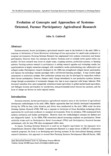Evolution of Concepts and Approaches of Systems-Oriented, Farmer Participatory Agricultural Research
JIRCAS international symposium series
| ISSN | 13406108 |
|---|---|
| NII recode ID (NCID) | AA1100908X |

Full text
intlsymp-9_63-74.pdf539.89 KB
Systems-oriented, farmer participatory agricultural research came to the forefront in the early 1980s in response to limitations of Green Revolution technology-driven approaches for s mall-scale producers in marginal environments. Farming Systems Research has emphasized both systems orientation and farmer participation. However, these two concepts are distinct. Systems exist at multiple levels nested within one another. On-farm research may focus on single crops, cropping systems, production systems, or farming systems. Farming systems research is participatory in setting research agendas and evaluating results, but experimentation is largely researcher-managed, with consultative modes predominating over collaborative and collegial modes. Participatory research developed in the 1990s has strengthened collegial farmer participation and replaces the technology transfer paradigm with a self-directed learning paradigm. It may involve single components or production systems. New production systems may also be developed by researchers without direct farmer participation. However, farmers rarely change immediately to new production systems. Systems change through accumulation of incremental changes over time is more congruent with farmer behavior. With increased transition from semi-commercial, subsistence-based agriculture to global market-based agriculture, new linkages increase participation by non-farmers, non-governmental actors become key partners, and the focus of change can become an entire regional system.
| Creator | John S. Caldwell |
|---|---|
| Publisher | Japan International Research Center for Agricultural Sciences |
| Available Online | |
| Issue | 9 |
| spage | 63 |
| epage | 74 |
| Language | eng |
